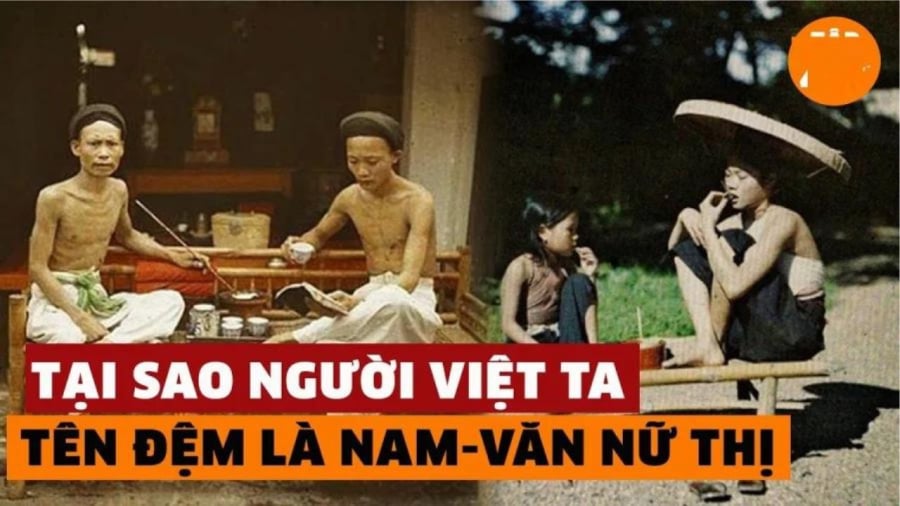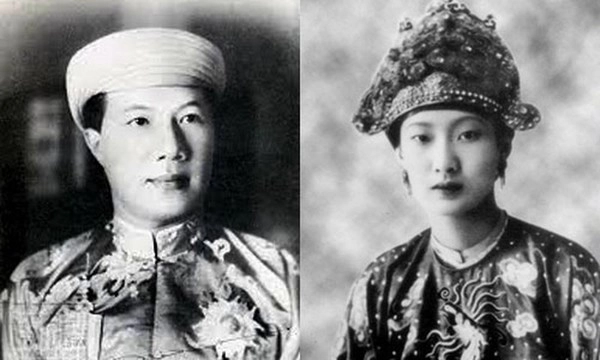In the Vietnamese naming convention, it is customary to put the middle name before the given name, such as “Nam Văn Nữ Thị”. This is a long-standing tradition that is preserved until today.

Nam Văn – Nữ Thị Middle Names
The Middle Name “Văn” for Boys
First and foremost, in the past, it was believed that having a son brings more blessings and “value” compared to having a daughter. For example, the saying “nhất nam viết hữu thập nữ viết vô” means one son is worth ten daughters. Furthermore, during the feudal era, only boys were allowed to go to school and take the imperial examinations. Every family hoped that their sons would possess knowledge, education, and deep literary skills. Therefore, when naming their children, they would use the middle name “Văn” so that their sons would have a smooth path to a successful career in academia.
Over time, the name element “Văn” became increasingly popular as parents aimed to fulfill their dreams. Gradually, this practice became ingrained in the Vietnamese consciousness, and to this day, many people across Vietnam still prefer the formula (Family Name) + Văn + (Given Name) to commemorate their ancestral roots.
The Middle Name “Thị” for Girls
For girls, the middle name often includes the character “Thị” to differentiate them from males. In reality, the word “thị” originated from the North and has been part of Vietnamese folklore for over a thousand years. “Thị” is a Vietnamese word of Chinese origin that refers to women. In the “Từ nguyên từ điển” dictionary, there is a phrase “Phu nhân xưng thị” which means “a woman is called thị”. The character “thị” usually appears after a person’s surname, for example, Dương thị, Lưu thị, Trần thị, which means “wife of someone from the Dương family,” “wife of someone from the Lưu family,” “wife of someone from the Trần family,” and so on.

In Vietnamese naming culture, people often mistake “thị” as a term related to women, hence naming girls with it.
In Vietnamese naming culture, people often mistake “thị” as a term related to women, hence naming girls with it. Since the 15th century, “thị” has been commonly used in female names in the formula (Family Name) + Thị + (Given Name). Few people know that “thị” originally meant “matured woman” (usually after marriage).
Today, due to cultural influences from various countries and the development of the internet, Vietnamese people have different ways of naming their children. Gradually, the middle names “Văn” and “Thị” are less common in the names of modern children. However, it continues to be a special folklore tradition of the Vietnamese people from ancient times to the present.
What to Avoid When Naming a Child?
Avoid naming the child the same as the ancestors
Throughout history, our ancestors have always taught us to remember our roots, express gratitude to our ancestors, and preserve the “honoring the old and respecting the young” values within the family. This principle should also be applied when naming our children, meaning we should avoid naming them the same as those who hold higher positions in the family and not use the names of our deceased ancestors. Naming children the same as their siblings of equal rank within the family is also discouraged.
As the saying goes, “Có thờ có thiêng, có kiêng có lành” (When there is respect, there are blessings). Therefore, naming children the same as their elder relatives is considered disrespectful, and these children often lack the support of their ancestors and the affection of their family.
Some young parents may argue that within their family, there are countless names, and it is unavoidable to have the same name for their children. However, this can still be avoided if parents carefully consider and research the names within three generations of their family and ensure that the names of their children do not repeat.
Avoid naming the child with ambiguous gender
Some people might think that giving a gender-neutral name, which can be interpreted as both male and female, will make their child more individualistic, and their child will appreciate such a name in the future. However, having a name that is difficult to distinguish between genders can cause many complications for your child. Mistaking the child’s gender on official documents is a common issue, and there is also a risk of teasing from peers at school.
Moreover, the name also has a significant impact on the child’s personality and gender identity. If you give your son a name like Ngọc Thủy, Hà Linh, Thu Dương, or give your daughter a strong name like Hoàng Thái, Thanh Minh, it will shape part of their personality according to their names. Gender-confusing names can also make others uncomfortable when mistakenly addressing them as “Miss” or “Sir” without knowing the correct gender of your child.

































